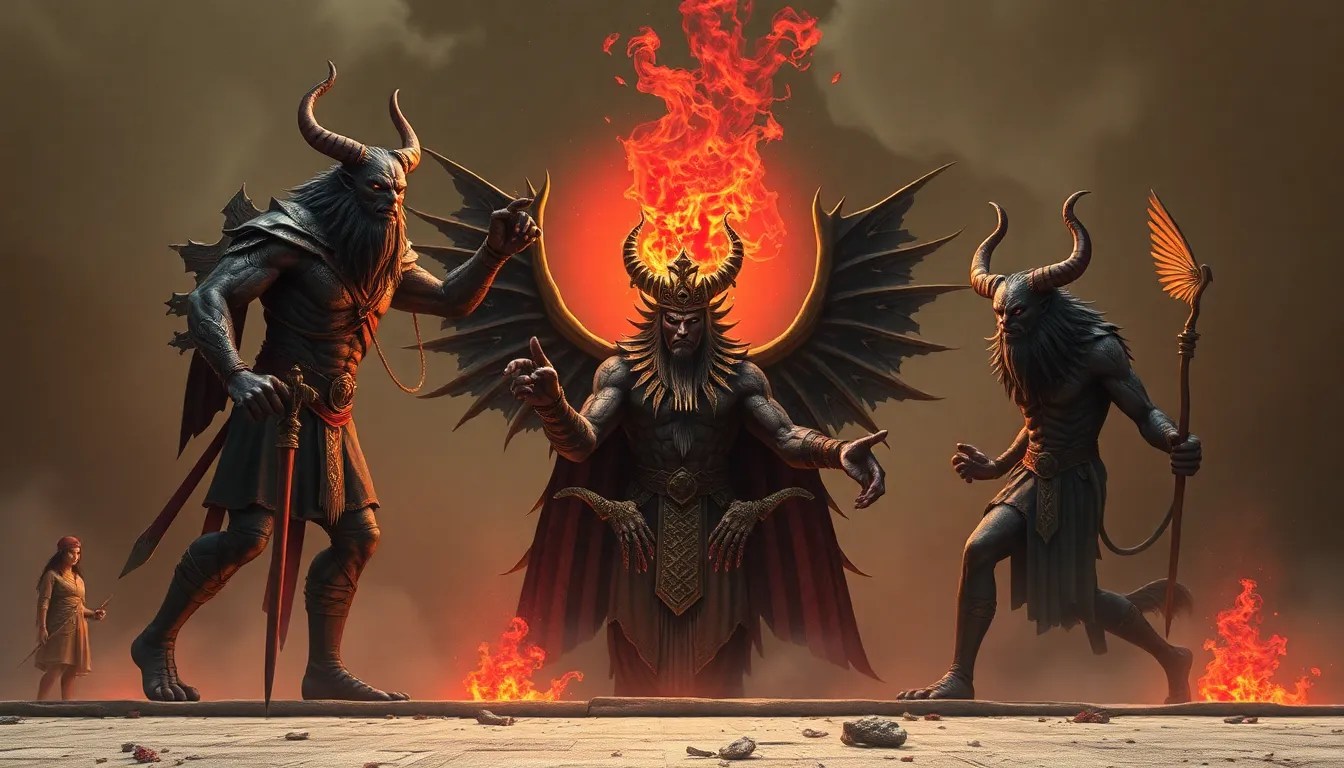The Role of Demons in Babylonian Kingship and Power
I. Introduction
Babylonian mythology is a rich tapestry of gods, goddesses, and supernatural beings that played a crucial role in the lives of the ancient Mesopotamian people. It provided a framework for understanding the world around them, influencing their culture, religion, and societal structure. Among the various entities in this mythology, demons held a significant place, particularly concerning the socio-political landscape of ancient Babylon.
Demons were not merely malevolent spirits; they embodied complex roles that intersected with kingship and power. This article aims to explore how demons influenced Babylonian governance and the perception of kingship, highlighting their dual nature as both protectors and harbingers of chaos.
II. Understanding Babylonian Demons
A. Definition and classification of demons in Babylonian mythology
In Babylonian mythology, demons are often classified based on their roles and attributes. They can be seen as:
- Protective beings: Demons that safeguard individuals from evil.
- Harmful spirits: Entities that bring misfortune and chaos.
B. Key demons and their attributes: Pazuzu, Lamashtu, and others
Some of the most prominent demons in Babylonian mythology include:
- Pazuzu: The king of the demons of the wind, often invoked for protection against other evil spirits.
- Lamashtu: A malevolent demon responsible for harming pregnant women and children, associated with disease and misfortune.
- Other notable demons: Various lesser-known demons that represented aspects of chaos and disorder.
C. The dual nature of demons: Protectors vs. Harbingers of Chaos
This duality is central to understanding how demons were perceived in Babylonian culture. While some demons were invoked for protection and healing, others were feared and considered agents of destruction. This complex nature made demons integral to the fabric of Babylonian life, influencing everything from personal decisions to state affairs.
III. The Concept of Kingship in Babylon
A. Definition of kingship in ancient Babylonian society
Kingship in ancient Babylon was not merely a political position; it was deeply intertwined with religious and social responsibilities. The king was seen as the earthly representative of the divine, tasked with maintaining order and justice.
B. The divine right of kings and the role of deities
The concept of the divine right of kings asserted that monarchs were chosen by the gods to govern. This belief was supported by rituals that linked the king to divine favor, further legitimizing their rule.
C. The king as a mediator between the gods and the people
In this role, kings acted as mediators who communicated the will of the gods to the people and vice versa. This mediation was crucial in maintaining social order and ensuring the prosperity of the state.
IV. Demons as Instruments of Power
A. The utilization of demons in royal propaganda
Demons were often depicted in royal propaganda to project power and dominance. By associating themselves with powerful demons, kings could enhance their authority and intimidate adversaries.
B. Rituals and ceremonies involving demons to legitimize kingship
Rituals that invoked the protection of demons were common during coronations and significant state events. These ceremonies served to:
- Legitimize the king’s rule.
- Invoke divine protection against enemies.
- Establish the king’s connection to the divine.
C. The role of dreams and omens in guiding kings through demonic influence
Dreams and omens were believed to be messages from the gods or demons, guiding kings in decision-making. Interpreting these signs was crucial for maintaining stability and ensuring a prosperous reign.
V. Demons in Governance and Justice
A. The influence of demons on law and order
Demons were often invoked in matters of law and governance. Their perceived influence was thought to enforce moral and ethical standards within society.
B. The perception of demons as enforcers of moral and ethical standards
The belief that demons could punish wrongdoing reinforced the legal system, providing a supernatural basis for justice.
C. Case studies: Historical instances of kings invoking demons for justice
Historical records indicate that some Babylonian kings would publicly invoke the names of demons when delivering justice, using their power as a deterrent against crime.
VI. The Relationship Between Kings and Demons
A. Kings as protectors against malevolent demons
Kings were seen as protectors who could ward off malevolent demons. This protective role was crucial in maintaining the stability of their reign.
B. The delicate balance between appeasing and controlling demonic forces
The relationship between kings and demons was complex; while kings sought to control and utilize demonic powers, they also needed to appease them to prevent chaos.
C. Symbolic representations of kingship in demonology
Demonology served as a symbolic representation of kingship, with various demons embodying the qualities that a king should possess, such as strength, wisdom, and justice.
VII. The Decline of Demonic Influence in Kingship
A. Historical shifts in Babylonian beliefs and the evolving role of kings
As Babylonian society evolved, so too did their beliefs about demons and kingship. The rise of new ideologies led to a gradual decline in the perceived power of demons in governance.
B. The impact of foreign influences and the rise of new religious ideologies
Foreign conquests and the introduction of new religious beliefs diminished the traditional roles of demons, leading to a re-evaluation of kingship and power.
C. The fading significance of demons in later Babylonian governance
By the later periods of Babylonian history, demons had become less central to the political narrative, reflecting broader changes in societal values and governance structures.
VIII. Conclusion
The intersection of demons and kingship in Babylonian culture reveals a complex relationship that shaped the socio-political landscape of ancient Mesopotamia. Demons served both as protectors and agents of chaos, influencing the perception of power and governance.
The legacy of Babylonian demonology continues to resonate in modern interpretations of power and authority, offering insights into the ways in which mythology can shape cultural and political ideologies. For those interested in further exploring Babylonian mythology, a wealth of resources and texts are available that delve deeper into this fascinating subject.



